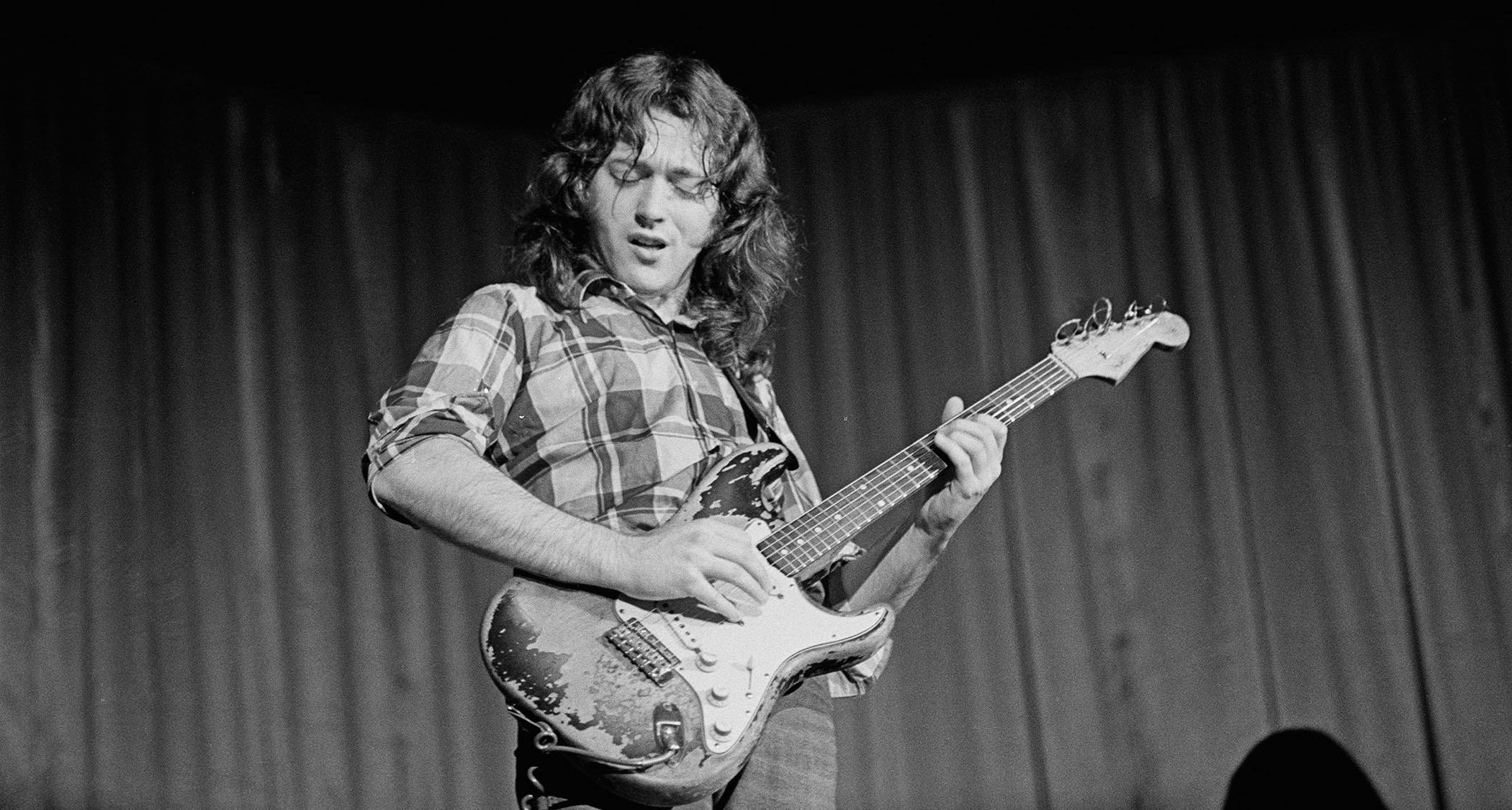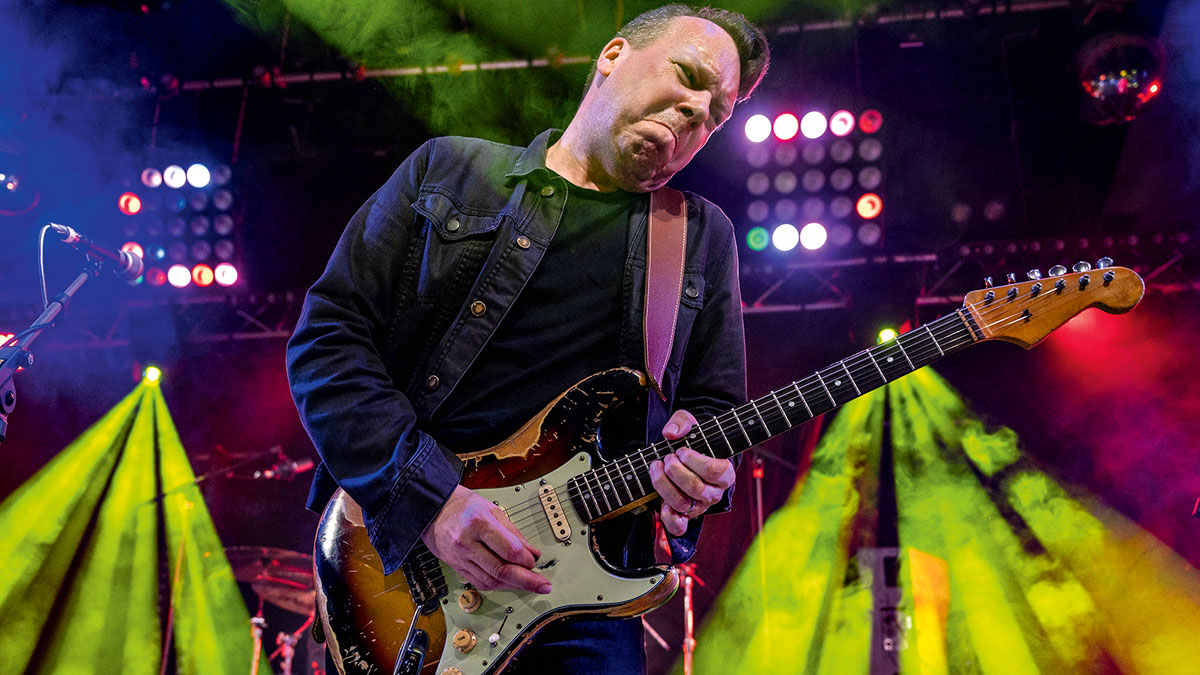“He was a lover of the blues, but it was the Irish side that helped him stand out against Eric Clapton or Peter Green”: What made Rory Gallagher a true guitar one-off – and how he ended up with his first Fender Strat by accident
Jim Kirkpatrick, one of the world's leading experts on Gallagher's playing, puts the late blues-rock hero's tone under the microscope, revealing the gear and approaches that made the Strat-toting phenom one of the all-time greats

Guitarist Jim Kirkpatrick is arguably best known for his work in British melodic rock band FM, whose new album Old Habits Die Hard is released in May. Jim also plays in Band of Friends, performing the music of Rory Gallagher with members of the late Northern Irish trailblazer’s own band.
When he connects with Total Guitar, he’s just returned from this year’s International Rory Gallagher Tribute convention, where he played through the actual amps heard on Rory’s famous recordings, nailing all the tones and techniques to keep that legacy alive…
Though he did occasionally use other models, it was usually a Stratocaster in Rory’s hands. Why do you think that is?
“It’s an interesting story. I’m not sure if he purposefully chose it to start off with. I believe there was a Strat in a shop window when he lived in Cork. He had his first guitar already, something like a Futurama, and apparently somebody had ordered a Strat in the wrong colour.
“It was most likely the first Strat in Ireland! It got taken back to the shop and Rory recognised it from players like Buddy Holly and Hank Marvin. An American instrument in Ireland back in the early ’60s would have been rare.”
He was fairly loyal to Fender over the years. There are only a handful of photos of him with a Les Paul, for example.
“He had a big guitar collection. There was a white Telecaster he used to play slide on. He never really replaced that one. There were a lot of one-off guitars, especially things he might use on a certain track, but few lasted the distance. A lot of those instruments were given to him, but you can tell he was the kind of person who had two or three guitars that did the job and didn’t feel like he needed anything else.”
Get The Pick Newsletter
All the latest guitar news, interviews, lessons, reviews, deals and more, direct to your inbox!
There’s a guy I know in Ireland who has Rory’s Marshalls, and when I play over there, he brings Rory’s JMP 2x12 combo
Can you talk us through the rig you use to get the Rory tone?
“He was really associated with a Vox AC30 and a treble booster. That was his sound for the mid-’70s, but he did move away from that to Marshall later on, which a lot of people tend to overlook. I’ve got the Rory signature treble booster and I was using it with one of his actual AC30s not long ago at the Rory convention.
“There’s a guy I know in Ireland who has Rory’s Marshalls, and when I play over there, he brings Rory’s JMP 2x12 combo. Obviously I don’t get to use that gear all the time, so I tend to stick with a Vox or a JMP-style Marshall.”

Like most players back then, he didn’t use too many pedals…
“It was few and far between. There was the treble boost, plus a flanger that got used on a couple of songs like Shadow Play. An octave pedal on a couple of later tracks. There was a Boss overdrive at one point, but he kept it simple.”
So what are your main instruments for the tribute shows?
“There are two that I’m using at the moment. There’s a Nash Strat that’s been worn down to look like Rory’s. And there’s another guy who runs DY Guitars down in Worcester. He does affordable copies of signature models and made me a Rory guitar. I don’t think he builds the bodies and necks, he assembles them and then winds the pickups himself. It’s a £600 guitar that sounds fantastic and plays well. Then I have a Telecaster for the slide things. That’s all I need!”
What do you think were Rory’s strongest suits as a player and what are the hardest songs to replicate?
“I think Rory was a really underrated acoustic player. He’s primarily known as an electric guitarist and most people’s vision of him is Irish Tour ’74 or Live in Europe – mainly those albums from that period.
“But he always did an acoustic segment. His fingerstyle playing and slide was fantastic and never given enough credit. Those are usually the hardest things to learn, songs like Barley & Grape Rag and Out on the Western Plain.”

And how about his electric material?
“He was advanced for his time. Take a song like They Don’t Make Them Like You Anymore – it’s like a swing tune. Nobody else was doing anything like that. His playing was great on Moonchild.
“Then there’s stuff like Edged in Blue where he went in more of a Jeff Beck direction. He liked using different tunings and capos. I learned how to play in open G and open A through songs like Souped-Up Ford and Bullfrog Blues.
“He also had his mandolin! There were a lot of different sides to him as a player, like the jazziness of When My Baby She Left Me, which is a Sonny Boy Williamson tune. That one’s tricky to learn!
“A lot of slide players like Duane Allman to Derek Trucks tend to work in open E, while Rory was often using open G like Ry Cooder, with a lot of drive from his amp. He’d turn the tone down on his Telecaster to get rid of the scratchiness – that’s how he controlled the noise.”
As you say, he was a lot more than just a blues guitarist.
“There was a big Irish influence, particularly that kind of rhythmic jig. He grew up around it, those Celtic flavours would have been inherent. His playing was very green in that sense – just listen to the intro to A Million Miles Away!
“He was a lover of the blues, but it was the Irish side that helped him stand out against Eric Clapton or Peter Green. He came from a different country with its own influences.”
Even though his health wasn’t great towards the end and his performances were subdued, his guitar playing got better and better
A lot of his music lived in that Mixolydian world, where he would twist major and minor pentatonics together.
“Definitely! He also played in natural minor as well – you can hear it on A Million Miles Away, Shadow Play and Bad Penny. Those are the songs where he’d drop a few extra notes in. Even though his health wasn’t great towards the end and his performances were subdued, his guitar playing got better and better. If you watch Live At The Cork Opera House from 1987, he’s blinding!”
It is alleged that Jimi Hendrix was once asked how it felt to be the greatest guitar player in the world and his answer was “I don’t know, you’ll have to ask Rory Gallagher…”
“I don’t know if it’s true. I’ve tried finding the source online and there’s nothing concrete. From what I know, someone might have insinuated Jimi saying something like that and Rory’s brother Dónal, who was also his manager, grabbed hold of that and ran with it. Jimi might have said it, but there’s no proof. It’s just one of those folklore things!”
- Old Habits Die Hard is out now via Frontiers.
Amit has been writing for titles like Total Guitar, MusicRadar and Guitar World for over a decade and counts Richie Kotzen, Guthrie Govan and Jeff Beck among his primary influences as a guitar player. He's worked for magazines like Kerrang!, Metal Hammer, Classic Rock, Prog, Record Collector, Planet Rock, Rhythm and Bass Player, as well as newspapers like Metro and The Independent, interviewing everyone from Ozzy Osbourne and Lemmy to Slash and Jimmy Page, and once even traded solos with a member of Slayer on a track released internationally. As a session guitarist, he's played alongside members of Judas Priest and Uriah Heep in London ensemble Metalworks, as well as handled lead guitars for legends like Glen Matlock (Sex Pistols, The Faces) and Stu Hamm (Steve Vai, Joe Satriani, G3).
“It holds its own purely as a playable guitar. It’s really cool for the traveling musician – you can bring it on a flight and it fits beneath the seat”: Why Steve Stevens put his name to a foldable guitar
“Finely tuned instruments with effortless playability and one of the best vibratos there is”: PRS Standard 24 Satin and S2 Standard 24 Satin review











